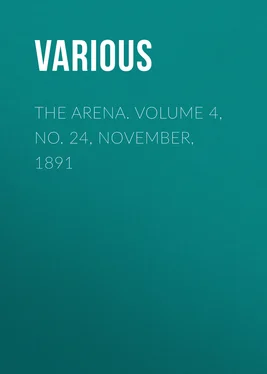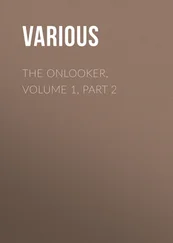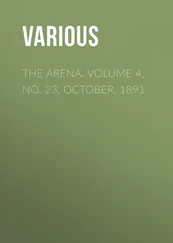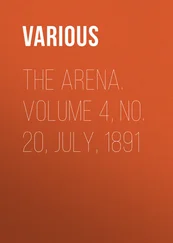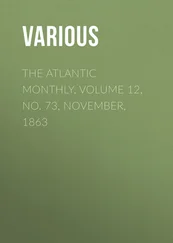Various - The Arena. Volume 4, No. 24, November, 1891
Здесь есть возможность читать онлайн «Various - The Arena. Volume 4, No. 24, November, 1891» — ознакомительный отрывок электронной книги совершенно бесплатно, а после прочтения отрывка купить полную версию. В некоторых случаях можно слушать аудио, скачать через торрент в формате fb2 и присутствует краткое содержание. Жанр: foreign_antique, periodic, foreign_edu, на английском языке. Описание произведения, (предисловие) а так же отзывы посетителей доступны на портале библиотеки ЛибКат.
- Название:The Arena. Volume 4, No. 24, November, 1891
- Автор:
- Жанр:
- Год:неизвестен
- ISBN:нет данных
- Рейтинг книги:4 / 5. Голосов: 1
-
Избранное:Добавить в избранное
- Отзывы:
-
Ваша оценка:
- 80
- 1
- 2
- 3
- 4
- 5
The Arena. Volume 4, No. 24, November, 1891: краткое содержание, описание и аннотация
Предлагаем к чтению аннотацию, описание, краткое содержание или предисловие (зависит от того, что написал сам автор книги «The Arena. Volume 4, No. 24, November, 1891»). Если вы не нашли необходимую информацию о книге — напишите в комментариях, мы постараемся отыскать её.
The Arena. Volume 4, No. 24, November, 1891 — читать онлайн ознакомительный отрывок
Ниже представлен текст книги, разбитый по страницам. Система сохранения места последней прочитанной страницы, позволяет с удобством читать онлайн бесплатно книгу «The Arena. Volume 4, No. 24, November, 1891», без необходимости каждый раз заново искать на чём Вы остановились. Поставьте закладку, и сможете в любой момент перейти на страницу, на которой закончили чтение.
Интервал:
Закладка:
Free trade has not demonstrated its infallibility in the single country where it has been tried. The question, therefore, for the people of the United States is, whether under their conditions it is well to make the change which England made nearly fifty years ago, and to adopt a system of which the success has been doubtful in its chosen field. In order to decide the question intelligently we must put aside all vague confusions about an exact science which will work the same results everywhere because it operates under an immutable law. Even if free trade had been a brilliant and conclusive success in England, of which there is no proof, does it follow that it would be a better system for us? We have, to begin with, in our possession, instead of a small island a continent capable of almost every variety of natural production and mechanical industry. This is also a new country and a young country. We have been developing our resources rapidly for the last hundred years, but they are still not fully developed. The policy of the United States, although with many fluctuations, has been in the main to develop all our natural and mechanical opportunities to their fullest extent. The free trader is always ready with the terse statement that, “You cannot make yourself rich by taxing yourself,” followed by a freshly humorous allusion to lifting one’s self by one’s boot-straps. He then feels that he has met the case. If political economy and the financial policy of nations were as simple as this argument seems to imply, life would be an easier thing both for nations and individuals. Unluckily the problems of mankind which engage their interests and passions cannot be solved by cheap aphorisms. The statement of the free trader about taxing yourself in order to grow rich has a final and conclusive sound, but it is simply sound. There are, for example, plenty of towns in New England which have built factories and relieved certain persons from taxation in order to secure their capital and industry, and the additional population and the increased taxes which have thus come to the town have made it rich or at least richer than it was before. It is quite possible to adjust taxes or to offer bounties or premiums in such a way as to add to the aggregate wealth of the community.
The free trader’s question is not really pertinent. The point is not whether you will tax yourself in order to grow rich, but whether you will so frame your tax laws and so raise your revenues as to discriminate in favor of your own production and your own wages against the production and wages of other countries, or whether, on the other hand, you will let everything strictly alone and leave the country to come out the best way it can. The general policy of the United States has been to give encouragement to the domestic producer and manufacturer, and maintenance to high rates of wages, by laying duties in such a way as to discriminate in their favor against those outside. The result, speaking broadly, has been to put the United States as a competitor into countless lines of new industries. The effect of the competition of the United States, added to that already existing in the rest of the world, has been to reduce the world’s prices in the products of those industries according to the well-known laws of competition. Hence comes the lowering of prices to the consumer in protected articles, a fact which is the cause of much satiric laughter to the free trader because he can neither deny nor explain it.
The practical question now before the people of the United States is twofold: shall we protect new and nascent industries, and shall we continue to guard existing industries and existing rates of wages against an undue competition? John Stuart Mill admits the soundness of the former policy, and with that admission protectionists may be content. In fact, it may be doubted whether any intelligent man would argue to-day that it would have been wiser for the United States never to have built up any industries, but to have remained a purely agricultural community, dependent on Europe for everything in the way of manufacture. I think we may assume that the wisdom of protecting nascent industries in a country with such capacities and resources as the United States can hardly be questioned.
Nevertheless, the most hotly contested feature of the McKinley bill was that which continued the policy of protecting nascent industries in certain products, and notably that of the manufacture of tin plate. If the protection of nascent industries at the beginning of this century was a sound policy, then it is a sound policy to industries of that description to-day. Whether we have tin mines or not (and it now appears that we have) there is no reason on the surface why we should not buy our Straits tin and manufacture tin plate as well as England. Some Democratic newspapers appear to have an idea that the tin mines of Cornwall and Wales make a monopoly in this direction for England. They forget that to-day the tin used by England comes chiefly from the Straits, and she can buy it there on no better terms than the United States. If the policy of protection to nascent industries is sound, then the tariff of 1890 is sound in this direction, and we should seek its results in the new industries which have been started since it became a law.
In the second branch, the question of whether we should continue protection to industries already established is one largely of degree and of discretion. Where a removal of the duty would mean either a heavy reduction of wages or a stopping of existing industries with the rise of prices consequent upon the withdrawal of the United States from the world’s competition, then the removal of the duty would be a misfortune. It would be a misfortune not only to the industry which was ruined and to the wage earners who were reduced to idleness or poverty, but it would be an injury to the consumer because it would in a short time raise the price of the world’s production diminished by our withdrawal. In industries where no such results could possibly be feared, or where the production of the article is not possible in the United States, it would certainly be wise to remove duties, and this has been the purpose of the protectionists and of the Republican party.
The policy of protection has received its most recent expression in this country in the tariff of 1890. It is a truism that no tariff bill, whether passed by free traders or protectionists, can hope to be perfect. It is sure to have defects in detail and some inequalities. The McKinley bill was not exempt from error, but the question for the people to decide now is whether it is well to abandon the protective policy and substitute that of free trade. In 1888 the cry was that we must get rid of the surplus revenue and that that necessity made a revision of the tariff imperative. The Republican party since it has been in power has taken two hundred and forty-six millions of the accumulated surplus and paid off the bonded indebtedness of the country to that amount. It has also, by the removal of the duty on sugar and other articles, reduced the annual surplus revenue some fifty or sixty millions. The danger from the surplus, therefore (and it was a very real danger), is at an end. No party need be called upon now to dispose of the annual surplus which was taking so many millions out of the channels of trade. The question between the parties and before the country on this issue is very much simpler than it was. It is whether we shall repeal the tariff of 1890, abandon the protective system and take up free trade, or whether we shall maintain the protective system, making such amendments to the law as may from time to time seem necessary.
I have tried to state the general argument upon the question of free trade or protection in its broadest way. It only remains to bring forward so far as possible the facts which show, in part at least, the results of the tariff of 1890, for upon those results as a whole its justification or condemnation must rest. It is important to know first whether the new industries which the McKinley bill was designed to encourage have begun to start, and second, whether the bill has had the disastrous effect in raising prices which was so loudly asserted and prophesied by its opponents at the last election.
Читать дальшеИнтервал:
Закладка:
Похожие книги на «The Arena. Volume 4, No. 24, November, 1891»
Представляем Вашему вниманию похожие книги на «The Arena. Volume 4, No. 24, November, 1891» списком для выбора. Мы отобрали схожую по названию и смыслу литературу в надежде предоставить читателям больше вариантов отыскать новые, интересные, ещё непрочитанные произведения.
Обсуждение, отзывы о книге «The Arena. Volume 4, No. 24, November, 1891» и просто собственные мнения читателей. Оставьте ваши комментарии, напишите, что Вы думаете о произведении, его смысле или главных героях. Укажите что конкретно понравилось, а что нет, и почему Вы так считаете.
